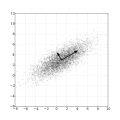Principal component analysis (PCA) is a linear dimensionality reduction technique with applications in exploratory data analysis, visualization and data...
117 KB (14,851 words) - 06:44, 17 June 2025
Componential analysis (feature analysis or contrast analysis) is the analysis of words through structured sets of semantic features, which are given as...
3 KB (325 words) - 16:34, 26 May 2024
In signal processing, independent component analysis (ICA) is a computational method for separating a multivariate signal into additive subcomponents....
49 KB (7,462 words) - 10:49, 27 May 2025
subcomponents Neighbourhood components analysis, an unsupervised learning method for classification multivariate data Componential analysis This disambiguation...
1 KB (171 words) - 15:42, 29 December 2020
Ethnolinguistics (section Componential analysis)
which analyzes how people classify and label their world, and componential analysis, which dissects semantic features of terms to understand cultural...
13 KB (1,483 words) - 10:34, 24 May 2025
multivariate statistics, kernel principal component analysis (kernel PCA) is an extension of principal component analysis (PCA) using techniques of kernel methods...
9 KB (1,338 words) - 13:19, 25 May 2025
Component analysis is the analysis of two or more independent variables which comprise a treatment modality. It is also known as a dismantling study. The...
2 KB (204 words) - 02:11, 27 July 2020
Robust Principal Component Analysis (RPCA) is a modification of the widely used statistical procedure of principal component analysis (PCA) which works...
15 KB (1,765 words) - 07:59, 28 May 2025
Dependent component analysis (DCA) is a blind signal separation (BSS) method and an extension of Independent component analysis (ICA). ICA is the separating...
3 KB (461 words) - 13:08, 29 January 2024
Directional component analysis (DCA) is a statistical method used in climate science for identifying representative patterns of variability in space-time...
15 KB (1,917 words) - 02:35, 2 June 2025
Semantic feature (redirect from Semantic component)
component. Additionally, semantic features/semantic components are also often referred to as semantic properties. The theory of componential analysis...
6 KB (629 words) - 11:18, 4 June 2025
Factor analysis is a statistical method used to describe variability among observed, correlated variables in terms of a potentially lower number of unobserved...
72 KB (10,026 words) - 19:52, 18 June 2025
Neighbourhood components analysis is a supervised learning method for classifying multivariate data into distinct classes according to a given distance...
6 KB (1,166 words) - 21:10, 18 December 2024
ANOVA–simultaneous component analysis (ASCA or ANOVA-SCA) is a statistical technique used to analyze complex datasets, particularly those arising from...
7 KB (1,100 words) - 16:03, 30 May 2025
(1931-1960s), relational semantics (from the 1960s by John Lyons) and componential analysis (from the 1960s by Eugenio Coseriu, Bernard Pottier and Algirdas...
4 KB (414 words) - 22:27, 20 October 2023
describe words multilingually. Such elements provide a bridge to componential analysis and the initial work of ontologies. Asemic writing Meme Phoneme...
1 KB (107 words) - 16:22, 10 March 2025
Connected-component labeling (CCL), connected-component analysis (CCA), blob extraction, region labeling, blob discovery, or region extraction is an algorithmic...
27 KB (3,190 words) - 11:16, 26 January 2025
Functional principal component analysis (FPCA) is a statistical method for investigating the dominant modes of variation of functional data. Using this...
16 KB (2,151 words) - 09:26, 29 April 2025
the components of a particular chemical compound (qualitative analysis), to identify the proportions of components in a mixture (quantitative analysis),...
22 KB (2,498 words) - 02:20, 1 June 2025
interconnected components. Network analysis is the process of finding the voltages across, and the currents through, all network components. There are many...
39 KB (5,846 words) - 22:53, 23 July 2024
Multilinear principal component analysis (MPCA) is a multilinear extension of principal component analysis (PCA) that is used to analyze M-way arrays,...
9 KB (974 words) - 00:25, 17 June 2025
Linear discriminant analysis (LDA), normal discriminant analysis (NDA), canonical variates analysis (CVA), or discriminant function analysis is a generalization...
47 KB (6,037 words) - 16:42, 16 June 2025
Principal Component Analysis (sPCA) is a multivariate statistical technique that complements the traditional Principal Component Analysis (PCA) by incorporating...
9 KB (947 words) - 13:09, 9 June 2025
considered at a particular level of analysis Lumped element model, a model of spatially distributed systems Component video, a type of analog video information...
2 KB (280 words) - 12:12, 8 November 2024
of principal component analysis for categorical data.[citation needed] MCA can be viewed as an extension of simple correspondence analysis (CA) in that...
10 KB (1,571 words) - 15:43, 21 October 2024
kernel-independent component analysis (kernel ICA) is an efficient algorithm for independent component analysis which estimates source components by optimizing...
4 KB (516 words) - 03:53, 24 July 2023
Multivariate statistics (redirect from Multivariable analysis)
subdivision of statistics encompassing the simultaneous observation and analysis of more than one outcome variable, i.e., multivariate random variables...
18 KB (2,015 words) - 08:53, 9 June 2025
analysis of variance to data analysis was published in 1921, Studies in Crop Variation I. This divided the variation of a time series into components...
56 KB (7,645 words) - 06:39, 28 May 2025
"Yankee Kinship Terminology: A Problem in Componential Analysis." In E.A. Hammel, ed., Formal Semantic Analysis, pp259–297. Special Publication, American...
11 KB (1,189 words) - 19:18, 21 February 2025
equivalence." Nida also developed the componential analysis technique, which split words into their components to help determine equivalence in translation...
15 KB (1,764 words) - 16:41, 19 March 2025




